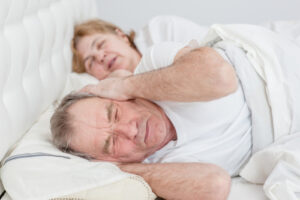Connection Between Sleep Apnea and Accelerated Aging
 Sleep apnea is a very common condition in which those affected continuously pause or stop their breathing during sleep. Since this occurs while patients are asleep, those who have sleep apnea often have no idea they stop breathing throughout the night unless their partner tells them, or they experience some of the common daytime symptoms, such as headaches or constant fatigue. While some of the health risks linked to sleep apnea are well-known, preliminary research presented at SLEEP 2019—the 33rd Annual Meeting of the Associated Professional Sleep Societies—suggested a new link between sleep apnea and another health concern: accelerated aging.
Sleep apnea is a very common condition in which those affected continuously pause or stop their breathing during sleep. Since this occurs while patients are asleep, those who have sleep apnea often have no idea they stop breathing throughout the night unless their partner tells them, or they experience some of the common daytime symptoms, such as headaches or constant fatigue. While some of the health risks linked to sleep apnea are well-known, preliminary research presented at SLEEP 2019—the 33rd Annual Meeting of the Associated Professional Sleep Societies—suggested a new link between sleep apnea and another health concern: accelerated aging.
According to recent studies, the interruptions in nightly sleep caused by sleep-disordered breathing (SDB) was shown to lead to a faster rate of aging among patients. Additionally, the link between SDB and epigenetic (relating to non-genetic factors) aging was stronger in women when compared to men, although men typically have more severe cases of sleep apnea and SDB. The findings presented in the research were supported by a spokesperson for the American Academy of Sleep Medicine, who commented that sleep apnea’s potential link to faster aging may be one catalyst that will encourage patients to pursue treatment for their sleep-disordered breathing. Luckily, it typically does not require invasive or complex techniques to improve the symptoms of sleep apnea and treat the condition. In many cases, simply wearing a mouth guard-like device called SOMNODENT® can open up the airways during sleep, prevent interrupted breathing, and reduce the likelihood of accelerated aging from sleep apnea.
For more information about our non-invasive sleep apnea treatment options, please contact Scripps Center for Dental Care today.
For more information, or if you with to schedule a consultation, please don’t hesitate to contact our office today.
Contact Us


